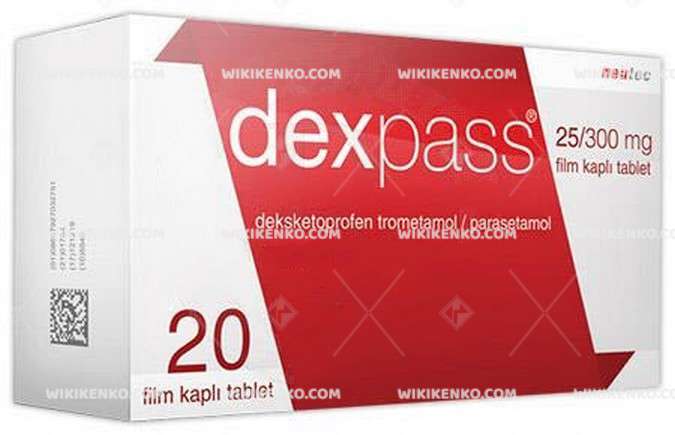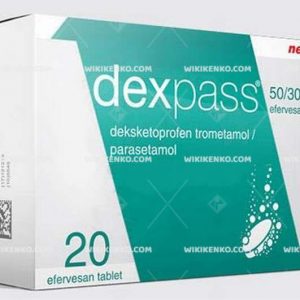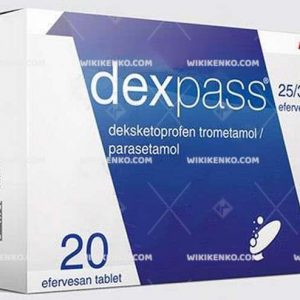Dexpass Film Coated Tablet 25 Mg
The “Dexpass Film Coated Tablet 25 Mg” is a pharmaceutical wonder that brings together two potent active ingredients, Dexketoprofen Trometamol and Paracetamol. This article aims to unveil the secrets of this medication, shedding light on its composition, benefits, precautions, and dosages, ensuring that you are well-informed about its usage.
| Dosage form | |
|---|---|
| Pack size | |
| Potency | 25 Mg/300Mg |
| Manufacturer | |
| Origin | |
| Generic Name (Ingredient) | Each Film-Coated Tablet Contains 36.88 Mg Dexketoprofen Trometamol And 300 Mg Paracetamol, Equivalent To 25 Mg Dexketoprofen. |
Assuming your emergency circumstances for this product, visit Urgent Quotation page. Besides, for any pharmaceutical questions, please ask us in the comments section.
Description
Dexpass Film Coated Tablet 25 Mg Ingredients:
| Key Ingredient | Quantity in Each Tablet |
|---|---|
| Dexketoprofen Trometamol | 36.88 mg |
| Paracetamol | 300 mg |
Dexketoprofen Trometamol
Dexketoprofen Trometamol, a nonsteroidal anti-inflammatory drug (NSAID), stands as a potent painkiller. Its utility extends to addressing mild to moderate pain conditions such as muscle and bone pain, menstrual discomfort, toothache, and postoperative pain. Marketed under various brand names, including Keral and Enantyum, it holds the potential to provide much-needed relief to those in need.
- Key Ingredient: Dexketoprofen Trometamol
- Quantity in Each Tablet: 36.88 mg
Paracetamol
Paracetamol, an integral part of the “Dexpass Film Coated Tablet 25 Mg,” is a non-opioid analgesic and antipyretic agent. Its versatile role encompasses the alleviation of fever and mild to moderate pain. Often found as a component in cold and flu medications, it is also prescribed on its own, adhering meticulously to the International Nonproprietary Name (INN) generic name system.
- Key Ingredient: Paracetamol (also known as acetaminophen)
- Quantity in Each Tablet: 300 mg
Side Effects
While the efficacy of Dexpass is undeniable, it’s crucial to acquaint oneself with potential side effects. These may vary from person to person but have been reported to include:
- Low fever coupled with nausea, stomach pain, and loss of appetite.
- Dark urine and clay-colored stools.
- Jaundice, characterized by the yellowing of the skin or eyes.
It is imperative to recognize that this list does not encompass all potential side effects. In the event of any unusual symptoms while taking Dexpass, prompt consultation with your healthcare provider is highly recommended. Like any medication, it’s paramount to employ Dexpass under the vigilant guidance of a healthcare professional, adhering meticulously to prescribed dosages to mitigate potential side effects.
The Allergic Reaction Enigma
As with any medication, Dexpass carries the potential to induce allergic reactions in some individuals. These reactions can range from mild skin irritation to the severe and life-threatening anaphylaxis.
Mild Allergic Reaction Symptoms:
- Skin rash
- Itching or hives
- Swelling of the face, lips, or tongue
Severe Allergic Reaction Symptoms:
- Difficulty breathing
- Swelling of the throat or tongue
- Rapid pulse
- Dizziness, lightheadedness, or loss of consciousness
Should you encounter any of these symptoms post-Dexpass consumption, it is imperative to seek immediate medical attention. It’s important to note that this list is not exhaustive, and consulting your healthcare provider is always advisable for personalized guidance on potential side effects or allergic reactions.
Onset of Action
For those eager to experience the benefits of Dexpass, rest assured that its onset of action is swift. Following oral ingestion, which contains Dexketoprofen, the medication springs into action within approximately 30 minutes. The plasma half-life of Dexketoprofen hovers around 4-6 hours.
This means that the medication starts its beneficial work within half an hour of consumption and maintains its effects for roughly 4 to 6 hours. Nevertheless, individual experiences may vary, emphasizing the importance of consulting a healthcare provider for tailored information.
Interaction with Other Medications
Dexpass can indeed be harmoniously administered with other medications. However, it is of utmost importance to be vigilant of potential interactions. Notably, Dexpass may reduce the effectiveness of diuretics and other antihypertensive drugs. If you are currently taking any of these medications, it is strongly advised to engage in a thorough discussion with your healthcare provider before introducing Dexpass into your regimen.
Furthermore, it is essential to recognize that while Dexpass can be amicably integrated with other medications, it should not be combined with additional nonsteroidal anti-inflammatory drugs (NSAIDs) or medications that elevate the risk of bleeding. As always, it is in your best interest to converse with your healthcare provider to ensure that all your medications and supplements can be safely integrated. They can provide you with the most precise and personalized advice grounded in your health history and current medications.
Dosages
The recommended dosage for Dexpass is not one-size-fits-all. It fluctuates in correspondence with the form of the medication and the patient’s condition. Here are some general dosage guidelines:
Tablet Dosage
- For the general population, the recommended dosage typically ranges from 12.5 mg every 4-6 hours to 25 mg every 8 hours. The total daily dose should not exceed 75 mg.
- In elderly patients, it is advisable to commence therapy at the lower end of the dosage spectrum (50 mg total daily dose).
- Patients grappling with mild to moderate hepatic dysfunction should embark on therapy with reduced doses (50 mg total daily dose) while remaining under close surveillance.
- Patients exhibiting mildly impaired renal function should commence with an initial dosage of 50 mg total daily dose.
Injection Dosage
- For adults, the recommended dose is 50 mg every 8-12 hours, with the possibility of repeating the administration 6 hours apart. The total daily dose should not exceed 150 mg.
Paracetamol Dosage
- For adults, the general dosing guidelines encompass 325 to 650 mg every 4 to 6 hours, or 1000 mg every 6 to 8 hours, whether orally or rectally.
- In the case of Paracetamol 500mg tablets, the recommendation stands at two 500 mg tablets orally every 4 to 6 hours.
Please bear in mind that these are overarching guidelines, and the precise dosage may fluctuate contingent on individual circumstances. It is non-negotiable to engage in a dialogue with a healthcare provider for the most accurate information pertaining to your situation.
| Dosage Guidelines | Tablet Dosage | Injection Dosage | Paracetamol Dosage |
|---|---|---|---|
| For the general population | 12.5 mg every 4-6 hours or 25 mg every 8 hours | Not applicable | Not applicable |
| In elderly patients | 50 mg total daily dose | Not applicable | Not applicable |
| Patients with mild to moderate hepatic dysfunction | 50 mg total daily dose | Not applicable | Not applicable |
| Patients with mildly impaired renal function | 50 mg total daily dose | Not applicable | Not applicable |
| For adults | Not applicable | 50 mg every 8-12 hours with the possibility of repeating the administration 6 hours apart | 325 to 650 mg every 4 to 6 hours or 1000 mg every 6 to 8 hours, whether orally or rectally |
| For Paracetamol 500mg tablets | Not applicable | Not applicable | Two 500 mg tablets orally every 4 to 6 hours |
Benefits
The “Dexpass Film Coated Tablet 25 Mg” stands as a pharmaceutical masterpiece, orchestrating a symphony of benefits through its dynamic duo of active ingredients: Dexketoprofen Trometamol and Paracetamol.
Dexketoprofen Trometamol:
- Analgesic: Serving as a non-steroidal anti-inflammatory drug (NSAID), Dexketoprofen Trometamol is an analgesic, proficient in pain relief.
- Anti-inflammatory: In addition to its pain-relieving prowess, Dexketoprofen Trometamol boasts anti-inflammatory attributes, enabling the reduction of inflammation, a common source of pain.
Paracetamol:
- Analgesic: Paracetamol mirrors the analgesic capabilities of Dexketoprofen Trometamol, thus contributing to pain alleviation.
- Antipyretic: Paracetamol is also gifted with antipyretic properties, facilitating the reduction of fever.
The amalgamation of these two formidable active ingredients within the “Dexpass Film Coated Tablet 25 Mg” equates to effective relief from an array of pain and fever scenarios. However, it is of paramount importance to employ this medication under the meticulous guidance of a healthcare professional, while faithfully adhering to prescribed dosages to preempt potential side effects.
Precautions
The administration of the “Dexpass Film Coated Tablet 25 Mg” demands a judicious approach, underpinned by the following precautions:
General Precautions:
- Allergies: If you possess a known allergy to Dexketoprofen Trometamol, Paracetamol, or any other constituent of Dexpass, abstain from its usage.
- Medical Conditions: If you bear certain medical conditions such as heart disease, liver disease, kidney disease, or a history of stomach ulcers or bleeding, it is imperative to apprise your healthcare provider before initiating Dexpass.
- Pregnancy and Breastfeeding: Should you be pregnant, planning to conceive, or engaged in breastfeeding, it is prudent to consult your healthcare provider before commencing Dexpass.
Drug Interactions:
- Other Medications: Dexpass may interact with other medications. Thus, it is of paramount importance to relay information about all the medications you currently consume.
- Alcohol: While embarking on Dexpass, shun alcohol consumption, as it may heighten the risk of liver damage.
Overdose:
- If you harbor suspicions of a Dexpass overdose, seek immediate medical attention.
Always bear in mind that it is indispensable to confer with your healthcare provider prior to commencing any new medication. They hold the expertise to dispense the most accurate and personalized guidance, predicated on your health history and concurrent medications.
Conclusion
In conclusion, the “Dexpass Film Coated Tablet 25 Mg” is a testament to the marvels of pharmaceutical science, uniting two powerful active ingredients for the benefit of pain and fever relief. However, this medication’s potency is balanced by the need for caution and vigilance. By embracing the insights into its composition, potential side effects, allergic reactions, dosages, benefits, and precautions, you become an informed and empowered user of this valuable pharmaceutical tool. Always remember that your healthcare provider stands as your guiding light on your journey to optimal health and well-being.
Use the form below to report an error
Please answer the questions as thoroughly and accurately as possible. Your answers will help us better understand what kind of mistakes happen, why and where they happen, and in the end the purpose is to build a better archive to guide researchers and professionals around the world.
The information on this page is not intended to be a substitute for professional medical advice, diagnosis, or treatment. always seek the advice for your physician or another qualified health provider with any questions you may have regarding a medical condition. Always remember to
- Ask your own doctor for medical advice.
- Names, brands, and dosage may differ between countries.
- When not feeling well, or experiencing side effects always contact your own doctor.
Cyberchondria
The truth is that when we’re sick, or worried about getting sick, the internet won’t help.
According to Wikipedia, cyberchondria is a mental disorder consisting in the desire to independently make a diagnosis based on the symptoms of diseases described on Internet sites.
Why you can't look for symptoms on the Internet
If diagnoses could be made simply from a textbook or an article on a website, we would all be doctors and treat ourselves. Nothing can replace the experience and knowledge of specially trained people. As in any field, in medicine there are unscrupulous specialists, differences of opinion, inaccurate diagnoses and incorrect test results.





Reviews
There are no reviews yet.